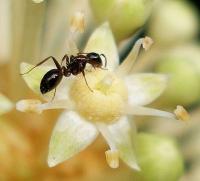How to Get Rid of Ants in your Garden
 Removing ants from your garden can prove troublesome
Removing ants from your garden can prove troublesomeResilience and perseverance are required if you want to eradicate or at least diminish ants in your garden.
Armies of ants that invade your garden can initiate a long and drawn out war to try and eradicate them. Lawns can be particularly effected by an ant attack; the ants excavate the soil, leaving little hills of soil that look unsightly.
Sometimes, the anthills can be big enough to smother low growing plants and stunt their growth. Soil is brought to the surface as the ants extend their underground home. Ants are particularly abundant on light, free draining soils.
Ants feed on other insects including other ants. They also feed on honeydew which is the sticky, sugary substance excreted by aphids. This relationship between the ants and aphids can cause the aphid colony to significantly increase in your garden because the ants will vigorously defend aphids from their natural predators such as ladybirds in order to maintain their supply of honeydew. Ants will also carry aphids from one plant to another which is not very desirable if you are a keen gardener.
If you have problems with ants in your garden, it is possible to reduce the number of ants but completely eradicating them can prove extremely difficult. Here are some suggestions for eradicating problem ant nests in your garden:
- Nests can be treated with proprietary dust or powders, there are also sprays available.
- Disturbing the nests is also a good way to begin the fight against the ants. Wearing Wellington boots you can use a garden fork to thoroughly disturb the nest, pouring boiling water on immediately afterwards, killing all the ants as they come out to defend their territory.
- Another technique on a warm summer day is to place upturned clay flowerpots over the nests. In the warmth of the day the ants will bring their eggs and cocoons up to the pots. They can then be destroyed, again using boiling water. If this technique is used a number of times the nest population can be significantly diminished.
- A biological solution is also available to attack ant colonies. Companies selling natural pest and disease garden remedies stock a microscopic nematode that can be added to water and then poured into the nests. This is best done between April and October when the soil is warm enough for the nematodes to be effective.
Personally, I would never try and get rid of the ants on my lawn because they are the primary diet of the green woodpeckers that regularly visit for a meal; that is always a wonderful site. In fact if I thought I would attract more woodpeckers to my garden I would encourage more ants!
Ant Picture by tanakawho
Filed under Pests & Diseases.

